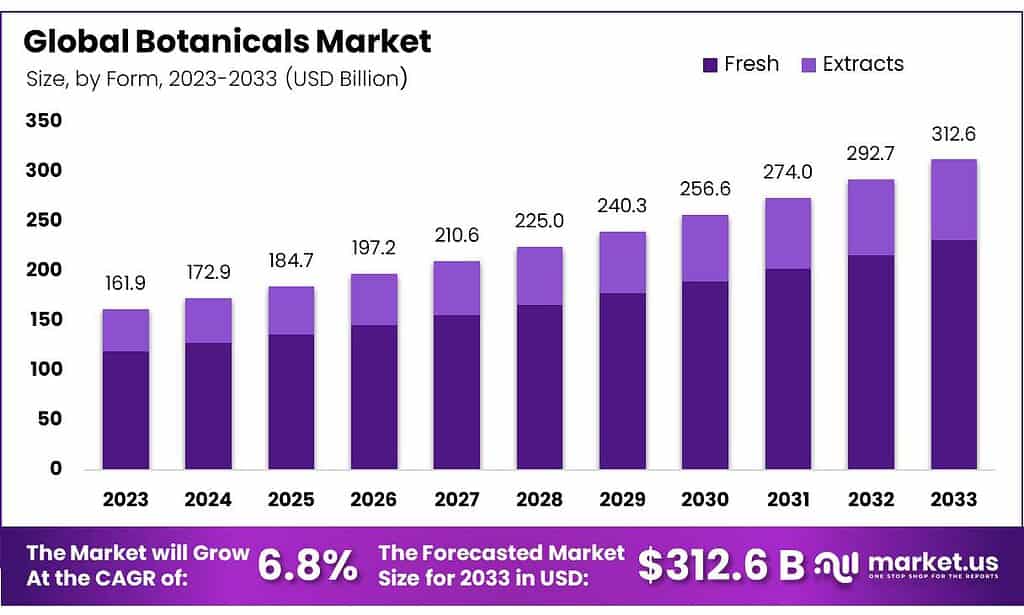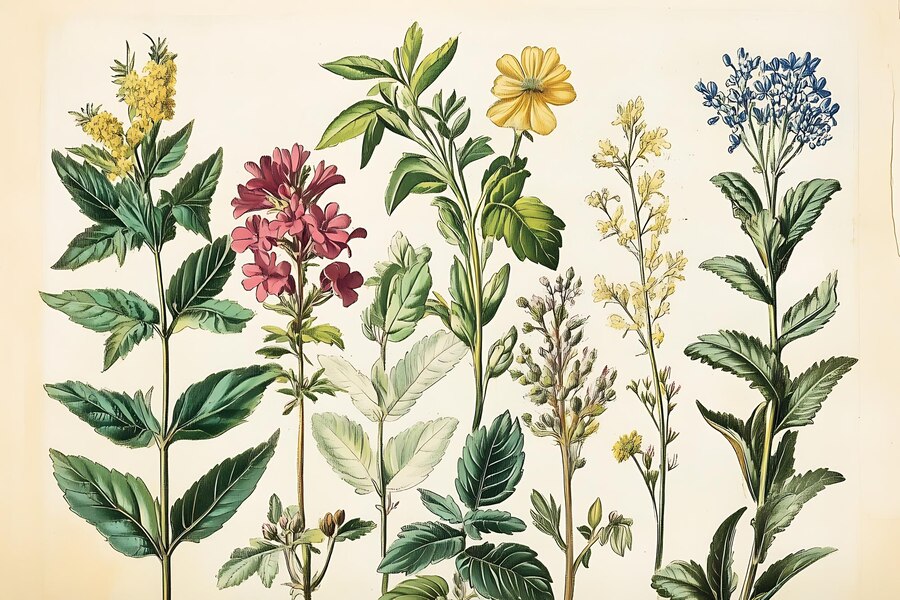According to Market.us, The Global Botanicals Market is expected to be worth around USD 312.6 billion by 2033, up from USD 161.9 billion in 2023. This market is estimated to register a CAGR of 6.8%.
The global Botanicals Market is experiencing robust growth, driven by increasing consumer interest in natural and organic products across various sectors, including food and beverages, pharmaceuticals, and cosmetics. This trend is fueled by rising health awareness and a growing preference for plant-based ingredients, leading to a surge in demand for botanical extracts.
Additionally, the market benefits from innovations in extraction technologies and sustainable sourcing practices. As consumers prioritize wellness and eco-friendly products, the botanicals market is poised for continued expansion, with significant opportunities for new product development and market penetration in emerging economies.
Key Takeaway
- The Global Botanicals Market was valued at USD 161.9 billion in 2023 and is projected to grow steadily to reach USD 312.6 billion by 2033 with an anticipated compound annual growth rate (CAGR) of 6.8% between 2024-2033.
- Among forms, Fresh botanicals accounted for the largest market share of 74.0%.
- Among sources, Root botanicals accounted for the majority of the market share with 27.4%.
- Based on application, Pharmaceuticals are expected to account for the largest market share in 2023 with 40.1%.
- Increasing demand for natural and organic products is expected to drive the market.
- Europe is the leading region in the global market with a revenue share of 34.6%.

Factors affecting the growth of the Botanicals Market
- Increased Health Awareness: Consumer preferences have shifted towards natural and organic products due to a growing awareness of health and wellness. This trend is driving demand for botanical ingredients in dietary supplements, pharmaceuticals, and nutraceuticals.
- Regulatory Support: Governments and international bodies have increasingly supported the use of botanicals through favorable regulations. For instance, the European Union and the United States have frameworks that encourage the use of natural ingredients in various consumer products, enhancing market growth.
- Advancements in Extraction Technologies: Technological advancements have improved the efficiency and effectiveness of botanical extracts, which has increased their appeal across different applications.
- Expansion in Application Areas: Botanicals are being increasingly incorporated into a wide array of products, from food and beverages to personal care items. This diversification has opened new markets and opportunities for growth.
- Research and Development: Increased investment in R&D activities by major players in the pharmaceutical, food and beverage, and cosmetics sectors to explore potential benefits and applications of botanicals has spurred market growth.
- Consumer Demand for Transparency: There is a growing demand among consumers for transparent labeling and the traceability of ingredients, which has boosted the botanicals market as consumers seek products with clear, natural, and ethical ingredient lists.
- Globalization of Herbal Medicine: The globalization of herbal medicine, facilitated by international trade and the internet, has broadened the consumer base for botanical products, pushing market boundaries and encouraging cross-regional product offerings.
Top Trends in the Global Botanicals Market
- Increased Demand for Natural Products: There is a growing consumer preference for natural and organic products, which has spurred the demand for botanical ingredients across several sectors.
- Expansion in Functional Foods and Beverages: Botanicals are increasingly being utilized in functional foods and beverages due to their health-enhancing properties. Ingredients such as turmeric, ginger, and green tea are popular for their anti-inflammatory, antioxidant, and metabolic benefits.
- Regulatory Support for Botanical Products: Regulatory bodies worldwide are increasingly recognizing the therapeutic benefits of botanicals, leading to more streamlined approvals for botanical-based health products.
- Rise of Personalized Nutrition: Personalized nutrition, which tailors dietary supplements and functional foods to individual health needs and genetic profiles, is emerging as a key market segment.
- Sustainability and Ethical Sourcing: Consumers and businesses are prioritizing sustainability in sourcing practices. The botanicals market is responding with more transparent supply chains and increased use of ethically sourced and certified organic botanicals.
- Integration of Digital Tools and AI in Supply Chains: Digital tools and artificial intelligence (AI) are being leveraged to improve the traceability and efficiency of botanical supply chains.
Market Growth
The global botanicals market is experiencing significant growth, driven primarily by increasing consumer awareness of natural health products and the expanding application of botanical extracts in pharmaceuticals, cosmetics, and food industries. This growth is facilitated by the rising demand for organic and plant-based products, coupled with advancements in extraction technologies and sustainable agriculture practices. Key market players are focusing on expanding their product range and geographical presence to capitalize on emerging market opportunities. The trend towards natural and holistic health solutions is expected to continue driving market expansion in the foreseeable future.
Regional Analysis
In 2023, Europe held a 34.6% share of the global botanicals market, leading due to its consumers’ preference for natural and clean-label products. This preference is fueled by heightened health awareness and a move towards sustainable and organic consumption. The European food and beverage sector, rich in diversity and culinary heritage, incorporates botanicals in various products including beverages, functional foods, and supplements.
Additionally, Europe’s regulatory environment supports natural ingredient usage, fostering growth in the botanicals sector. The cosmetics industry in Europe also leans towards natural ingredients, enhancing the demand for botanicals in beauty products. Europe’s strategic geographical position further strengthens its market presence through efficient trade routes that support the import and export of botanical products.
Scope of the Report
| Report Attributes | Details |
| Market Value (2023) | USD 161.9 Billion |
| Forecast Revenue (2033) | USD 312.6 Billion |
| CAGR (2024 to 2033) | 6.8% |
| Europe Market Share | 34.6% |
| Base Year | 2023 |
| Historic Period | 2020 to 2022 |
| Forecast Year | 2024 to 2033 |
Market Drivers
The botanicals market is primarily driven by increasing consumer awareness and demand for natural and organic products in food, cosmetics, and pharmaceuticals. The health and wellness trend has significantly influenced this shift, as botanicals are perceived to offer various health benefits without the side effects of synthetic alternatives. The growing preference for plant-based diets and clean-label products further fuels market expansion.
Additionally, advancements in extraction technologies have improved the quality and availability of botanical ingredients, making them more appealing to manufacturers. Regulatory support for natural ingredients across various countries also propels market growth. However, sustainability concerns related to the sourcing of botanicals may challenge market expansion but also drive innovations in sustainable practices.
Market Restraints
The global botanicals market faces constraints due to a stringent and diverse regulatory landscape, which varies significantly across regions. In the United States, botanicals are regulated under the Dietary Supplement Health and Education Act by the FDA, while the European Union employs guidelines set by the European Food Safety Authority. This regulatory discrepancy complicates compliance, creating barriers to international trade and affecting global supply chains.
The lack of regulatory harmonization can restrict market access for certain botanical ingredients, limiting consumer choice and market growth. Furthermore, evolving regulations in various regions add uncertainty, deterring investment and causing delays in market entry due to rigorous documentation and compliance requirements.
Opportunities
The global botanicals market is experiencing robust growth, driven by increasing consumer preference for natural and organic products. This trend is notably evident in sectors such as pharmaceuticals, cosmetics, and food and beverages, where botanical extracts are prized for their health benefits and natural properties. The market is also benefiting from technological advancements in extraction and processing techniques, which enhance the purity and efficacy of botanical ingredients.
Moreover, the rising popularity of herbal and traditional medicine offers significant opportunities for market expansion. Additionally, regulatory support for natural products in various regions is fostering market growth, creating lucrative opportunities for new entrants and existing players to innovate and expand their product portfolios.
Report Segmentation of the Botanicals Market
By Form Analysis
The global botanicals market is categorized by form into fresh and extracts, with the fresh segment commanding a dominant revenue share of 74.0% in 2023. Predominantly utilized in the food and beverage, pharmaceutical, and cosmetics industries, fresh botanicals are increasingly in demand due to their applications as natural flavorings and ingredients. This surge in demand is primarily fueled by a growing consumer inclination towards natural and organic products, which are perceived as inherently more ‘natural’ than their extracted or processed counterparts. This shift can be attributed to heightened health awareness and a preference among consumers for products characterized by minimal processing and the absence of additives.
By Source Analysis
Chewable supplements captured the largest market share due to their ease of consumption. In 2023, root-based botanicals dominated the market with a 27.4% share, attributed to their significant medicinal benefits. These botanicals are increasingly favored in the wellness industry for their health advantages. This trend is driven by a rising consumer preference for natural over synthetic products, heightened by health and wellness concerns amplified by the global pandemic. The demand for root botanicals has surged, making them crucial in applications across functional beverages, food, and dietary supplements, reflecting a broader shift towards health-conscious consumer behavior.
By Application Analysis
The global botanicals market is categorized into various segments, including pharmaceuticals, food and beverage, dietary supplements, personal care and cosmetics, and others. Pharmaceuticals command the largest share, accounting for 40.1% of the market. There is a discernible shift towards natural and alternative medicines globally, with botanicals favored for their natural origin, perceived safety, efficacy, and minimal side effects. The pharmaceutical sector is channeling significant investment into the research and development of botanicals, which facilitates the discovery and market introduction of innovative botanical-based pharmaceutical products. Additionally, regulatory landscapes in regions such as Europe and Asia provide robust frameworks supporting the approval and utilization of herbal medicines.
Recent Development of the Botanicals Market
- In May 2023, DSM and Firmenich merged, forming a new entity that assembles one of the most extensive innovation and creation communities in the fields of nutrition, health, and beauty. Boasting a workforce of nearly 30,000 and unparalleled capabilities rooted in over a century of pioneering scientific advancements, DSM-Firmenich is poised to be a pioneer in redefining, producing, and blending essential nutrients, flavors, and fragrances.
- In November 2023, MartinBauer declared the accomplished acquisition of Husarich GmbH, a well-regarded supplier of spices and herbs serving diverse sectors within the food industry. This acquisition stands as a significant achievement in the company’s expansion strategy, enhancing its prowess in the realm of the food industry.
- In October 2022, Givaudan Active Beauty launched Siliphos, a natural alternative to retinoids, which is extracted from milk thistle fruits and powered by Phytosome technology. Siliphos acts directly on collagen production to provide a natural, safe, and efficient skincare solution, suitable for delicate skin.
Competitive Landscape
In the dynamic global botanicals market of 2024, certain key players are poised to significantly influence the industry landscape. The Archer-Daniels-Midland Company remains a titan in the sector, leveraging its extensive supply chain and robust processing capabilities to meet the growing demand for natural and organic ingredients. Similarly, International Flavors & Fragrances, Inc. continues to innovate in the space of sensory experiences, enhancing consumer products with high-quality botanical extracts.
Koninklijke DSM N.V. is capitalizing on its expertise in science-based solutions, pushing forward with sustainable and efficacious botanical ingredients that cater to health-conscious consumers. Givaudan, maintaining its leadership in the flavor and fragrance industry, focuses on authenticity and traceability in its botanical sourcing, appealing to eco-aware consumers.
Additionally, smaller specialized firms like Herbanext Laboratories, Inc. and Blue Sky Botanics are carving niches with unique, locally sourced botanicals that support biodiversity and community development. These companies exemplify the market’s shift towards transparency and sustainability, aligning with consumer preferences for products that are not only effective but also ethically produced.
